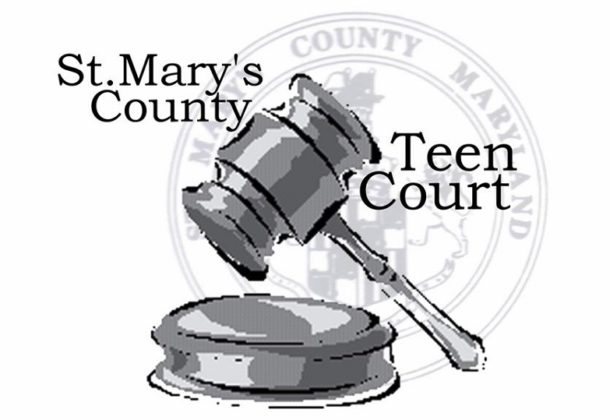St. Mary’s Teen Court Goes Virtual

facebook.com/StMarysTeenCourt
The St. Mary’s County Department of Aging & Human Services Teen Court program is proud to have successfully transitioned to a virtual system, the first in the state to have done so. According to Global Youth Justice Inc., St. Mary’s County Teen Court is now one of 25 programs throughout the country hosting virtual Teen Court sessions.
Teen Court is a juvenile justice diversion program offering first-time misdemeanor offenders, ages 11 to 17 and first-time traffic offenders younger than 18, the opportunity to accept accountability for their minor crimes without having to incur a permanent criminal record or traffic court fines and points. Teen Court is a voluntary program that allows juvenile offenders to be judged by a jury of their peers.
The 90-day processing requirement for juvenile cases was not changed when the courts closed in Maryland due to the COVID-19 emergency, said Gregory Jones, Teen Court coordinator with the St. Mary’s County Department of Aging & Human Services’ Human Services Division. When the courts closed, Mr. Jones had cases already scheduled for hearings and others waiting to be processed. Without an effective alternative the only thing that could be done was to forward them to the Maryland Department of Juvenile Services for formal processing, where the offenders would potentially get a juvenile criminal record, the very thing Teen Court is designed to prevent.
“We would be very remis if we didn’t do absolutely everything we can to give these children the second chance that Teen Court provides,” Mr. Jones said.
With this in mind, Mr. Jones began researching the few virtual programs that existed at that time, finding ones in Texas and Arizona that could potentially be reworked to suit the needs of the St. Mary’s County program. Security, confidentiality, and functionality were some of the major challenges these programs faced. With the security breaches and licensing requirements of some of the programs, the search continued for one that could meet the requirement of security, confidentiality, ease of access, and the ability to electronically move the offender and their parents during jury deliberations to a waiting area like was done when the cases were heard in the District Courthouse.
With the assistance of the St. Mary’s County Information Technology Department, an existing video conferencing program was found to have some features which would meet the operating requirements without disconnecting any of the participants. Having a virtual alternative to in-person court sessions also provides Teen Court with a very valuable backup tool moving forward, Jones said.
In addition to holding the actual court hearings virtually, Jones can conduct the intake interviews for new cases as well as the exit interviews following the completion of the hearing. He is able to scan the necessary paperwork and contracts and forward them to the parents via email. The development of these procedures not only facilitates addressing the cases still pending but allows for additional ones to be accepted until in-person court sessions can safely resume.
Michelle Lowe, Teen Court bailiff and jury monitor, is pleased to be involved in the virtual Teen Court and believes it sends a strong message to both the volunteers and the teens with cases being heard.
“Moving online makes them realize the importance of the program in general; moving online shows that we believe it to be an important part of what we do,” Ms. Lowe said.
While work was being done on the technical aspects of the virtual court session, Mr. Jones had to rewrite procedures designed for the in-person court sessions to operate in the virtual courtroom. He scheduled test sessions with the Teen Court adult, teen and community judge volunteers to walk through the evolving procedures, refine the technical operation of the virtual program and validate the operating procedures in a realistic setting.
“Credit truly goes to all the Teen Court volunteers who make this program happen. It still never ceases to amaze me the insight, dedication, and fairness of our teen volunteers. They are absolutely phenomenal,” Mr. Jones said.
Teen Court hearings are normally held the second and fourth Monday of each month, but they are currently being held more frequently to allow them to get through the backlog that built up while the virtual program was being developed and to accommodate the longer amount of time virtual hearings take. Teen Court utilizes the services of teen volunteers ages 11 to 17 as jurors and adult volunteers who serve as community judges, jury monitors, bailiffs and administrative aids.
“[Teen Court] is for teens and about teens, this really falls up the alley of the volunteers. We’re dependent upon our young people to make this program work and they’ve been pulling us along,” said Charlottis Woodley, Teen Court community judge, of the virtual program. She has been with the program for over eight years.
“Overall, [virtual Teen Court] has been very successful,” said Katie O’Toole, a Teen Court juror who has been with the program for a year.
Aside from some technical difficulties initially, the sanctions and order of procedures have been smooth, she said.
For more information, contact Mr. Jones at [email protected].























